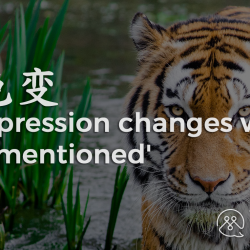Chinese Chengyu – 如鱼得水
Chinese Chengyu – 如魚得水 The chengyu 如鱼得水 (rú yú dé shuǐ) breaks down to like (如rú) fish (鱼yú in (得 dé) water (水shuǐ). This corresponds almost perfectly with the classic English idiom, “like a fish takes to water” but with an emphasis on finding a good environment or natural home. During the[…]












